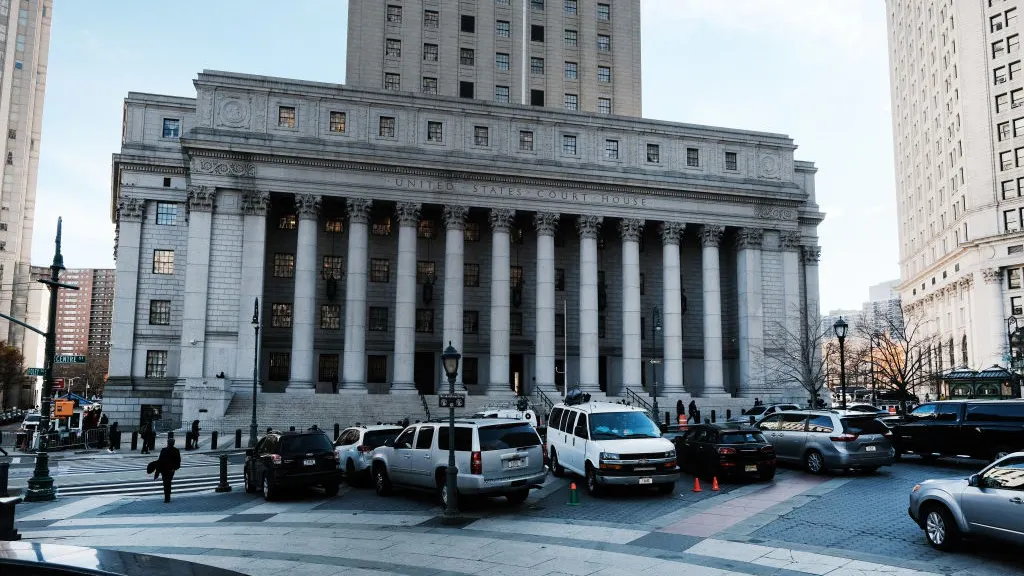It all comes down to this. On Monday, at the federal courthouse in lower Manhattan, the prosecution and defense in the Ghislaine Maxwell sex-trafficking trial each gave their closing arguments. Their respective cases closed weeks earlier than expected with far fewer witnesses than had been planned for. Over four hours, each side tried to convince the jury they had done enough.
Assistant U.S. Attorney Alison Moe delivered arguments for the government. She had a slow and steady rhythm, methodical if not moving. Her closing broke down to eight reasons “why you know Maxwell is guilty,” the you in this case being the jury.
The first reason offered was that Jeffrey Epstein and Ghislaine Maxwell “were a team, they were partners and lovers.” This is why, Moe confirmed, the government had shown a long series of photos of the pair over a stretch of time, with different hairstyles, often in an embrace. Maxwell was painted not as an employee who had a brief romantic relationship with Epstein, but as a life partner, “the lady of the house,” and a co-conspirator.
Second up for Moe was an argument that Maxwell used the same playbook, over and over, with multiple young girls. This included the creepy detail from two accusers that Maxwell had begun her grooming by teaching them how to massage his bare feet. The accusers who testified all described some similar experiences. Maxwell, Moe argued, had a system, and was the sophisticated, posh, “big sister” who set up the victims for Epstein.
Reasons 3, 4, and 5 why Moe argued the jury knows Maxwell is guilty was the testimony of accusers “Jane”, Annie Farmer, and “Carolyn,” respectively. Curiously the witness who went by ”Kate” was not listed, perhaps because the alleged sex with her happened when she was of age.
Each of these accusers, including Kate, described Maxwell as not only knowing about their abuse, but helping to facilitate it and in some cases even participating in it.
The 6th reason cited by the government was the infamous black address book put into evidence. This book allegedly contained names and numbers of myriad women and girls attached to Epstein as well as names of several prominent and wealthy figures, most of whom were never mentioned in the trial.
Seventh, Moe argued that Epstein had given Maxwell a lot of money over the years, in excess of 30 million dollars. Clearly, Moe argued, this was payment for her complicity and silence. The 8th and final reason given was the timeline, a timeline Moe suggested, that places Maxwell in the vicinity of the abuse.
Throughout the prosecution’s summation, Maxwell was still, staring kind of far away in her light sweater and slightly unkempt hair. Her eyes were set on something in the courtroom, but just what wasn’t clear, perhaps her future.
The defense closing was given by Laura Menninger who opened by saying, “Ghislaine Maxwell is an innocent woman wrongfully accused of crimes she did not commit.” It essentially focused on two arguments, first that the memories of the witnesses against Maxwell have changed over time and are questionable, and second that the government has not proven its case with sufficient evidence that she was involved in trafficking.
For example, Carolyn gave a clear-cut story about the abuse she received at the hands of Epstein in 2008 that did not mention Maxwell at all. It was the case with almost all of the witnesses that Maxwell came to play a larger role in their accounts over time, especially once the FBI launched its investigation into her.
Another example was Jane, who said she wasn’t sure if she had ever been alone with Epstein and Maxwell. There were many examples, but in fairness these are events that took place long ago.
In her rebuttal to the defense, closing Assistant U.S. Attorney Maureen Comey tried to explain this all away with a Thanksgiving analogy. The core memories of Thanksgiving, she argued, the turkey and stuffing, people will remember accurately, as to what year a certain guest came, or a certain event happened, that could be confused over time.
But the main thrust of Menninger’s closing, that there had not been enough direct evidence, such as flight logs, phone records, or emails showing Maxwell was involved in abuse simply wasn’t there. Instead, the jury was being asked to accept that she was too close to Epstein to not be involved. Or as Comey put it, “Of course she knew.”
After lengthy instructions to the jury from Judge Alison Nathan, it was time for the case to go to the jury. And now the case, and the rest of Ghislaine Maxwell’s life, are in their hands.

.png)
.png)

